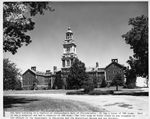Difference between revisions of "Portal:Featured Article Of The Week"
M-Explorer (talk | contribs) |
M-Explorer (talk | contribs) |
||
| (545 intermediate revisions by 2 users not shown) | |||
| Line 1: | Line 1: | ||
{{FAformat | {{FAformat | ||
| − | |Title= | + | |Title= Menniger Clinic |
| − | |Image= | + | |Image= KSmenningermainbldg.png |
| − | |Width= | + | |Width= 150px |
| − | |Body= | + | |Body= The Menninger Foundation of Topeka, Kansas, began as an outpatient clinic in the 1920s serving the local Shawnee County populace for a variety of ills. Karl Menninger began persuading his father Charles Frederick, or C.F., to focus the clinic's area of expertise on psychiatric and mental health cases. The Menningers opened the first clinic in 1919. In 1925 they purchased a farmhouse on the outskirts of town to for a sanitarium to provide long-term in-patient care. William Claire Menninger, Karl's youngest brother, joined Karl and their father in this practice that same year, fulfilling C.F.’s dream of a group practice with his sons. |
| + | |||
| + | The sanitarium began expanding almost immediately. The Menninger family opened other operations, including Southard School for children, one of the first such institutions for children with mental health disabilities. The family also began training psychiatric professionals and performing research, as well as publishing in the Bulletin of the Menninger Clinic. During the 1930s Will and other Menninger staff formulated and refined their milieu therapy, a treatment program focusing on the whole individual and every staff member’s interaction with a patient. | ||
| + | |||
| + | Karl became a popularly respected and well-known figure in psychiatry after the publication of his first book in 1930 and writing a regular advice column in the Ladies’ Home Journal. Will, like many other Menninger staff, joined the armed forces during World War II; by the end of the war he was a brigadier general and extremely influential in the treatment and care of soldiers with psychiatric problems. [[Menniger Clinic|Click here for more...]] | ||
}} | }} | ||
Revision as of 04:28, 12 January 2020
Featured Article Of The Week
Menniger Clinic
The Menninger Foundation of Topeka, Kansas, began as an outpatient clinic in the 1920s serving the local Shawnee County populace for a variety of ills. Karl Menninger began persuading his father Charles Frederick, or C.F., to focus the clinic's area of expertise on psychiatric and mental health cases. The Menningers opened the first clinic in 1919. In 1925 they purchased a farmhouse on the outskirts of town to for a sanitarium to provide long-term in-patient care. William Claire Menninger, Karl's youngest brother, joined Karl and their father in this practice that same year, fulfilling C.F.’s dream of a group practice with his sons.
The sanitarium began expanding almost immediately. The Menninger family opened other operations, including Southard School for children, one of the first such institutions for children with mental health disabilities. The family also began training psychiatric professionals and performing research, as well as publishing in the Bulletin of the Menninger Clinic. During the 1930s Will and other Menninger staff formulated and refined their milieu therapy, a treatment program focusing on the whole individual and every staff member’s interaction with a patient.
Karl became a popularly respected and well-known figure in psychiatry after the publication of his first book in 1930 and writing a regular advice column in the Ladies’ Home Journal. Will, like many other Menninger staff, joined the armed forces during World War II; by the end of the war he was a brigadier general and extremely influential in the treatment and care of soldiers with psychiatric problems. Click here for more...
